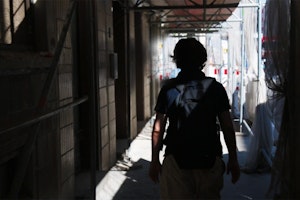In the Information Battle with Post-Soviet States, the West Is Losing Ground

In April 2015, the story of a 10-year-old girl being killed by a Ukrainian rocket attack in Donetsk spread on TV channels and became one of the BBC’s most watched pieces from Eastern Ukraine. Then covering the conflict for the BBC, Natalia Antelava decided to investigate further. After hours of research, she could not find any traces of the attack on the ground, and the body was nowhere to be found in the nearby morgues.
She decided to approach the Russian television crew that first reported on the attack; they confessed that the girl never existed and that they were told to run this story. The report was fake, but it achieved its goal: to provoke anger against Ukrainian troops.
Meanwhile, further to the east, authoritarian states have been trying to wash their poor human rights records through lobbying and self-promotion. Azerbaijan, for instance, has hosted large sporting events in Baku—such as the ill-fated 2015 European Games and Formula One motor racing—as thinly veiled self-promotional campaigns while shifting focus away from the government’s crackdown on civil society and media freedom.
For instance, in the run-up to the European Games, the award-winning investigative journalist Khadija Ismayilova, who has a track record of exposing high-level corruption in the country, was put in jail while awaiting trial on trumped-up charges—a clear attempt to silence her voice that backfired amid international criticism.
Azerbaijan and Kazakhstan, among others, also often hire Western public relations firms to help them craft a new image internationally. For its part, the Russian government and supportive oligarchs use think tanks and foundations both in Europe and in the post-Soviet region, mirroring Western-style values promotion but for a “traditional values agenda” that involves pushing back against LGBTI, migrants, and other minority rights.
Those are just some examples from The Information Battle, a new Foreign Policy Centre report that examines how this struggle over ideas and content is unfolding in Ukraine, Russia, Georgia, and elsewhere, including across Europe and America.
These information battles involve many weapons. Television, social media, and advertising are among the most powerful, especially when freedom of expression is restricted to pro-governmental opinions and media. The goal is not only to tell a story that puts you in a positive spotlight but to discredit either critical messages or messengers, spreading confusion or claims of hypocrisy when rebuttal doesn’t work.
In this struggle, the report concludes, Western governmental, intergovernmental, and nongovernmental institutions are losing ground, and it is time for them to take urgent and appropriate action if they hope to stem the tide of disinformation coming from the post-Soviet region. How can they fight back?
So far, fact-checking has been a major focus of the Western response. It is necessary to debunk myths and expose lies, but not sufficient. Independent consortiums of investigative journalists should receive stronger support and more resources from international broadcasters as well as the donor and NGO community, particularly in light of the continuing erosion of such capacity in so many newsrooms.
For instance, in her contribution to the report, Natalia Antelava mentions that she was only able to investigate the fake killing due to a slight lull in the media cycle, “an unbelievable luxury in the world of daily news.” She also calls for nuanced, in-depth reporting that would replace a simple opposition of two narratives—too often the case in coverage of the Ukrainian conflict with Russia.
Greater political and media scrutiny should also aim to expose authoritarian regimes trying to distract from their abuses through lobbying and self-promotion, while drawing particular attention to Western public relations firms, academics, and others who assist in massaging the reputations of these governments.
Developing quality content in Russian and regional languages can help draw people away from Kremlin-backed outlets by reaching out directly to local populations. Such content should combine evidence and clear narratives to engage skeptical audiences, and it should mainly be distributed by independent media from the region, such as Ukraine’s Hromadske TV or the exiled Azerbaijani channel Meydan TV—though international broadcasters such as the BBC and Radio Free Europe/Radio Liberty also have their place.
More broadly, Western governmental institutions and media need to critically analyze their own actions; widening the range of viewpoints they present may help mitigate the accusations of bias often leveled at them by Russia-backed outlets. They also must improve transparency, particularly around lobbying, without echoing the “foreign agent” style laws that are proliferating in the post-Soviet space.
Finally, it is crucial that Western actors fully understand that simply creating a counternarrative to the one developed by post-Soviet states will never enable them to win the battle of ideas. In isolation, such a strategy, far from achieving its goal, could strengthen rather than weaken the other side’s accusations of Western propaganda.
Western actors need to offer alternative frames and tools to analyze and decrypt information—wherever it comes from. And broadcasters and donors need to give journalists the time and resources to engage in in-depth reporting and investigate the truth.
